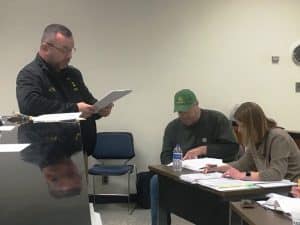News
Sheriff Gives Budget Committee Food for Thought About Creating New SRO Position
April 11, 2023
By: Dwayne Page
Sheriff Patrick Ray has given the county budget committee some food for thought about adding a new school resource officer position within the school system.
During a meeting last Monday, April 3, Sheriff Ray addressed the budget committee with the idea of creating a new (second) SRO position for the high school who could also fill in at either of the four other schools in the county when their own SRO officer has to be absent due to sickness or some other reason.
Currently, an SRO is stationed at each of the five schools in the county. Three of them are funded by the county and two by the school district but all five SRO’s work for the sheriff’s department.
According to Sheriff Ray, when an SRO has to be absent at either Northside, Smithville Elementary, or DeKalb West School due to sickness or some other reason, the SRO at DeKalb Middle School is reassigned to fill in while the high school SRO takes on the responsibility of the middle school as well as the high school since those buildings (DCHS & DMS) are connected. However, DMS staff have some concerns with that arrangement.
“If the county wanted to fund another school resource officer, that new SRO would go to the high school to give them two SROs at DCHS and then if one has to be out that extra SRO would fill in at one of the other schools,” said Sheriff Ray.
If no current deputy were interested in the SRO position, Sheriff Ray explained that there would be a cost of $2,800 to send someone to the training academy along with costs of $3,450 to provide uniforms, duty gear, a taser, and vests plus an additional cost of $550 for guns.
Under the current wage scale for the sheriff’s department, a new SRO would earn salary pay as a 1st tier deputy of $44,272 plus the costs of benefits, etc. and top out after the 6th year at $53,932 plus benefits, etc.
While he is not making a formal request for another SRO position, Sheriff Ray said he wanted to bring the idea before the budget committee as well as the school board for consideration.
“I have asked Director of Schools Patrick Cripps in the past about using some money they had for security that would cover an SRO because the high school is the busiest place so hopefully either here (county budget committee) or the school system it can be addressed,” said Sheriff Ray.
Meanwhile, Smithville-DeKalb County Rescue Squad Captain Dustin Johnson asked the budget committee to add another $2,000 to the county’s annual donation to the rescue squad. Johnson said the new money would be to add internet service to the rescue squad building located near Greenbrook Park for electronic filing of reports to the state and for the “IamResponding” app providing quicker alerts to rescue squad volunteers for faster response time. The county currently donates $40,821 per year to the Smithville-DeKalb County Rescue Squad operation as a non-profit entity.
DeKalb Emergency Management Agency Director Charlie Parker asked for adjustments in a couple of EMA budget line items totaling $2,800. Part of the extra funds would be to cover expenses for continuing installation of a radar omega system to provide advanced weather radar storm tracking alerts to the public via app. The project was started this past year and Parker said one site has been established at a water tower on Snow Hill although there are some internet issues with that location. Two more units are scheduled to be installed at water towers in the Jefferson Community and Dale Ridge Road. A portion of Parker’s funding request would also be for communication expense and for meals not already provided at meetings of the local Emergency Planning Committee and for snacks and refreshments during any future missing person search efforts such as the massive one held recently for Brittany Miller.
County Mayor Matt Adcock said the salary of the Veteran Service Officer position would be increased from $12,900 to $16,800 per year in the proposed new budget subject to approval of the budget committee and county commission.
EMS Director Hoyte Hale presented his proposed budget which includes a total increase in expenditures of $145,541.
The proposed EMS budget includes a $5,000 pay raise for the director, who currently earns less than six paramedics on his staff due to them getting a percentage increase in pay each year in the EMS step wage scale.
“Since the step scale was introduced, I have received one raise,” said Hale. “Even if this year’s raise goes into effect (director), two paramedics would still make more than me,” added Director Hale.
The EMS budget includes a one dollar per hour increase in pay for the newly created assistant director position. Increases have also been budgeted for part time and overtime pay for EMS Staff.
Inflation has necessitated requests for more money to cover higher costs of fuel and vehicle repair and maintenance.
“I am asking for an increase of $20,000 for vehicle maintenance,” said Hale. We have five ambulances, and they are all aging. The mileage is up and so is the costs for repair and maintenance. Since July 11, 2022, we have run 3,165 calls keeping the roads hot with hospital transfers, doctor’s appointments, and dialysis patients and that is why mileage is high. Last fiscal year we had 4,069 calls,” Hale continued. “We have a new ambulance coming in January 2024 and we hope to get a new fully equipped ambulance if the county applies and is approved for a CDBG block grant. I am also asking for an additional $15,000 for fuel and an extra $5,000 for drugs and medical supplies which continually costs more,” sale Hale.
The good news is that the EMS has brought in more revenues so far this year than last due to a better rate of collection.
“According to the Trustee, our revenues at the end of March were $1,079,569 for the year to date with three months to go. Last year by the end of March we had revenues of $922,002,” said Director Hale.
Judge Brandon Cox Presents Idea for Tighter Courthouse Security
April 11, 2023
By: Dwayne Page
Although he will make a formal request later, DeKalb County General Sessions and Juvenile Court Judge Brandon Cox has informed the budget committee that he has a plan for increased courthouse security.
Judge Cox made the suggestion last Monday, April 3 while presenting his budget requests for the 2023-24 fiscal year.
“I am going to ask for changes as far as courthouse security. We have a very open building. Its not the safest situation for anybody. I plan to ask that public access to the courthouse be limited to the first-floor entrance and that a full-time security position be funded with a metal detector to screen all persons entering the courthouse at all times when the courthouse is open. Key cards could be assigned to courthouse public officials and office personnel, attorneys, and judges for them to gain access through the other courthouse doors”, he said.
That issue will be discussed in more detail at a later budget committee meeting.
Meanwhile in his budget requests, Judge Cox has asked for an increase in pay for the Juvenile Court Youth Service Officer and a hike in the county’s appropriation for the DeKalb Recovery Court Program, much of which is grant funded.
Judge Cox said the youth service officer is already an important full-time position, but it will take on more responsibilities in the future.
“I hope to have our current youth service officer Richard Williams a while longer before he retires but for the next person who takes that position, I have set some new expectations including being a part time clerk, part time probation officer, part time on-call officer, part time advocate and full-time gatekeeper of the juvenile court. My expectation is for the youth service officer to be in the office each day from 8 to 4:30 p.m. although they will occasionally have to be out of the office for certain activities. Of course, they will be on call all the time,” said Judge Cox.
The current salary of the Juvenile Court Youth Service Officer is $42,360 a year.
The county currently budgets $46,700 per year in support of the DeKalb County Recovery Court. Judge Cox wants to increase that by $20,000 mostly to help meet increased costs for travel and contracted services.
Recovery Court, a 12-month program, provides an alternative to incarceration for eligible non-violent offenders, who are deemed substance dependent and who are seeking a life free of alcohol and drug abuse. Team members oversee the program locally in addition to Judge Cox and Recovery Court Coordinator Kate Arnold.
Judge Cox said the Recovery Court has proven successful and he would like to see it grow to serve more people in need.
“Our program is successful and one I take pride in. We are serving more participants than when I started but we don’t have a lot of resources locally, so we have to outsource them to help get people back on their feet. It’s not 100% successful but for those who do come in and graduate it can and has led to a change in not only their lives but in the lives of their children and families. We have had some participants come through and see their mother, father and other relatives get clean and sober. It has a far-reaching impact and I believe that dollar for dollar it is well worth spending in the community. My goal is to expand this program to reach as many people as possible,” said Judge Cox.
Chamber Seeks More Funding From County
April 11, 2023
By: Dwayne Page
The Smithville-DeKalb County Chamber of Commerce is asking for more financial support from the County.
Chamber Director Suzanne Williams addressed the county budget committee last Monday, April 3 at the courthouse asking for an increase from $25,000 to $60,000 in the county’s annual contribution to the chamber, a non-profit organization, established to promote local economic development and tourism. The Chamber is governed by its own board of directors and officers. Three years ago, the county raised its annual contribution to the Chamber from $17,500 to $25,000. The City of Smithville provides $15,000 each year. The Chamber is also supported by membership dues and fundraisers.
Chamber Director Williams said DeKalb County’s Chamber remains one of the lowest funded in the state and could use the extra money to support its budget and mission. In addition to promoting DeKalb County and raising funds for the Chamber Williams said she also spends much of her time writing and administering grants for the county among other tasks.
“Despite the fact that we have such high tourism dollars and bring in hundreds of thousands of dollars in grant money and save $75,000 being in the state’s Three Star Program, the DeKalb County Chamber is one of the most underfunded Chambers in the whole state. For example, Smith County has $10 million in tourism dollars, and they give their Chamber $42,500. Clay County gets $4.76 million in tourism dollars and their Chamber gets from them over $140,000. The Clay County Chamber gets all the county’s hotel/motel tax including a tax on houseboat rentals,” said Williams.
“I ask you to seriously consider contributing $60,000. That money you invest is not a donation. Although the Chamber is listed under donation (in county budget) we are anything but a donation. You (county) will get that back several times over (tourism and grant dollars),” Williams added.
Williams said Tourism in DeKalb County grew by 30% in 2021 and ranks third among the 14 Upper Cumberland Counties behind Putnam and Cumberland.
The budget committee has not yet acted on the request.
« First ‹ Previous 1 412 502 510 511 512513 514 522 612 2494 Next › Last »











